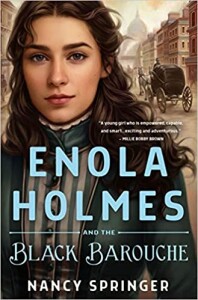 Nancy Springer’s Enola Holmes and the Black Barouche is the latest in a long running series, but was published after a long gap. Within the pages Enola, now on good terms with her brothers, finds herself and Sherlock wrapped up in a case involving a missing twin, with the titular clue coming into play sometime later.
Nancy Springer’s Enola Holmes and the Black Barouche is the latest in a long running series, but was published after a long gap. Within the pages Enola, now on good terms with her brothers, finds herself and Sherlock wrapped up in a case involving a missing twin, with the titular clue coming into play sometime later.
Ten years is a long time for a fictional character or lead in adventure and mystery stories to be retired. Longer indeed, than Sherlock Holmes disappeared from new publications following “The Adventure of the Final Problem.” One way the book attempts to solve the potential problem of reader knowledge is an introduction purporting to be by none other than Sherlock Holmes himself. He provides a short summary of the events of past Enola Holmes novels, from his point of view and with appropriate commentary. As a result this volume works well as a jumping on point to new readers, those who have seen the film, and those with experience with the books or their graphic adaptations.
A most enjoyable aspect of this book is that Enola does feel like a real teenage girl, right down to amusingly referring to a pet as though his dog breed was a surname. She has a great raw intelligence and courage, yet lives with a limited life experience compared to the more famous Sherlock Holmes and Doctor John H. Watson.
Tewky, a young man of somewhat noble ancestry whom Enola had rescued in the past, returns in this volume. Given his place in the film version of Enola Holmes this is not much of a surprise, although his return might seem ever so slightly contrived to readers who think he is only returning because of said appearance. He is in this volume, as he was in the past, an entertaining character and a nice companion for Enola.
The mental health and treatment of women during the late Victorian period is an important part of the story. As a result there are a number of moments which represent difficult reading, and also be quite instructive in their way as to the myriad different ways women could beade to suffer during that time.
The existing characters are very much in an appropriate style. Sherlock Holmes is a product of his time in the area of gender politics – more disinterested than actively misogynistic. Watson is as always wonderful, loving, and focused very much on the well-being of those around him. Mycroft, as so often happens, is nowhere to be seen. Mrs. Hudson, as she so often will, is happy to provide the little bit of help she would in any of the Sir Arthur Conan Doyle stories.
Overall, Enola Holmes and the Black Barouche is an excellent little volume, and readers should enjoy it greatly. While targeted to a middle-grade or YA market, the book is most definitely enjoyable for readers outside of that. To a Sherlockian, I can heartily recommend this little volume. To those who enjoyed the previous books, or the film, it is a can’t miss.
(Wednesday Books, 2021)
